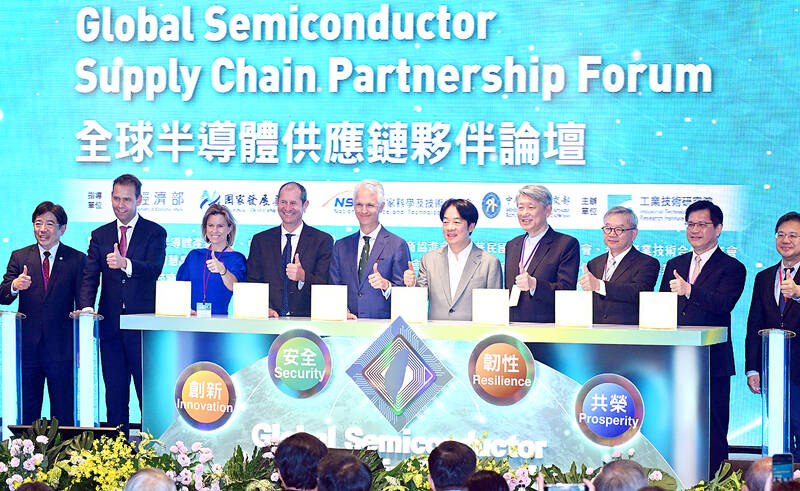Taiwan welcomes increased cooperation with the US in semiconductor manufacturing and artificial intelligence (AI), Minister of Foreign Affairs Lin Chia-lung (林佳龍) said yesterday.
Lin made the comment on Facebook a day after the Global Semiconductor Supply Chain Partnership Forum at Computex in Taipei, with the forum attended by 700 representatives of industry and the diplomatic missions of Japan, the US, the UK and the Netherlands.
The Ministry of Foreign Affairs, the Ministry of Economic Affairs, the National Development Council and the National Science and Technology Council (NSTC) jointly planned the forum, which revolved around the theme of innovation, security, resilience and shared prosperity, Lin said.

Photo: Liao Chen-huei, Taipei Times
President William Lai (賴清德) told the event that AI technology would become deeply ingrained in every aspect of human life and Taiwan aims to take a pivotal role in its development, Lin said.
Taiwan’s chip manufacturing depends on global collaboration and the government needs to work with businesses to pave the way for the rise of the AI sector, Lin quoted Lai as saying.
The success of Computex — which drew 50,000 participants from Tuesday to Friday — is a testament to Taiwan’s strategic value to the world’s chipmaking industry, Lin said.
US semiconductor design, Japanese manufacturing of key materials and Dutch lithography technology each play an indispensable role in the global collaborative chipmaking enterprise, he said.
Nvidia Corp’s planned Global Taiwan Headquarters, Taiwan Semiconductor Manufacturing Co, Hon Hai Precision Industry Co and the NSTC are to cooperate to make supercomputers for AI research, he said.
The group is to work with Wistron Corp and Siliconware Precision Industries Co to build supercomputers in the US, he said.
Taiwan welcomes US investments and the deepening of bilateral cooperation in AI-related technology and global economic links, he said, adding that Taiwan would continue to promote partnerships with all nations in the AI industry to contribute to global growth.

Taiwan is to commence mass production of the Tien Kung (天弓, “Sky Bow”) III, IV and V missiles by the second quarter of this year if the legislature approves the government’s NT$1.25 trillion (US$39.78 billion) special defense budget, an official said yesterday. Commenting on condition of anonymity, a defense official with knowledge of the matter said that the advanced systems are expected to provide crucial capabilities against ballistic and cruise missiles for the proposed “T-Dome,” an advanced, multi-layered air defense network. The Tien Kung III is an air defense missile with a maximum interception altitude of 35km. The Tien Kung IV and V

The disruption of 941 flights in and out of Taiwan due to China’s large-scale military exercises was no accident, but rather the result of a “quasi-blockade” used to simulate creating the air and sea routes needed for an amphibious landing, a military expert said. The disruptions occurred on Tuesday and lasted about 10 hours as China conducted live-fire drills in the Taiwan Strait. The Civil Aviation Administration (CAA) said the exercises affected 857 international flights and 84 domestic flights, affecting more than 100,000 travelers. Su Tzu-yun (蘇紫雲), a research fellow at the government-sponsored Institute for National Defense and Security Research, said the air

Taiwan lacks effective and cost-efficient armaments to intercept rockets, making the planned “T-Dome” interception system necessary, two experts said on Tuesday. The concerns were raised after China’s military fired two waves of rockets during live-fire drills around Taiwan on Tuesday, part of two-day exercises code-named “Justice Mission 2025.” The first wave involved 17 rockets launched at 9am from Pingtan in China’s Fujian Province, according to Lieutenant General Hsieh Jih-sheng (謝日升) of the Office of the Deputy Chief of the General Staff for Intelligence at the Ministry of National Defense. Those rockets landed 70 nautical miles (129.6km) northeast of Keelung without flying over Taiwan,

City buses in Taipei and New Taipei City, as well as the Taipei MRT, would on Saturday begin accepting QR code payments from five electronic payment providers, the Taipei Department of Transportation said yesterday. The new option would allow passengers to use the “transportation QR code” feature from EasyWallet, iPass Money, iCash Pay, Jkopay or PXPay Plus. Passengers should open their preferred electronic payment app, select the “transportation code” — not the regular payment code — unlock it, and scan the code at ticket readers or gates, General Planning Division Director-General Liu Kuo-chu (劉國著) said. People should move through the